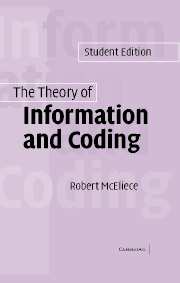Book contents
- Frontmatter
- Contents
- Editor's statement
- Section editor's foreword
- Preface to the first edition
- Preface to the second edition
- Introduction
- Part one Information theory
- Part two Coding theory
- 7 Linear codes
- 8 Cyclic codes
- 9 BCH, Reed–Solomon, and related codes
- 10 Convolutional codes
- 11 Variable-length source coding
- 12 Survey of advanced topics for Part two
- Appendices
- References
- Index of Theorems
- Index
7 - Linear codes
from Part two - Coding theory
Published online by Cambridge University Press: 05 June 2012
- Frontmatter
- Contents
- Editor's statement
- Section editor's foreword
- Preface to the first edition
- Preface to the second edition
- Introduction
- Part one Information theory
- Part two Coding theory
- 7 Linear codes
- 8 Cyclic codes
- 9 BCH, Reed–Solomon, and related codes
- 10 Convolutional codes
- 11 Variable-length source coding
- 12 Survey of advanced topics for Part two
- Appendices
- References
- Index of Theorems
- Index
Summary
Introduction: The generator and parity-check matrices
We have already noted that the channel coding theorem (Theorem 2.4) is unsatisfactory from a practical standpoint. This is because the codes whose existence is proved there suffer from at least three distinct defects:
(a) They are hard to find (although the proof of Theorem 2.4 suggests that a code chosen “at random” is likely to be pretty good, provided its length is large enough).
(b) They are hard to analyze. (Given a code, how are we to know how good it is? The impossibility of computing the error probability for a fixed code is what led us to the random coding artifice in the first place!)
(c) They are hard to implement. (In particular, they are hard to decode: the decoding algorithm suggested in the proof of Theorem 2.4–search the region S(y) for codewords, and so on–is hopelessly complex unless the code is trivially small.)
In fact, virtually the only coding scheme we have encountered so far which suffers from none of these defects is the (7, 4) Hamming code of the Introduction. In this chapter we show that the Hamming code is a member of a very large class of codes, the linear codes, and in Chapters 7–9 we show that there are some very good linear codes which are free from the three defects cited above.
Information
- Type
- Chapter
- Information
- The Theory of Information and CodingStudent Edition, pp. 139 - 166Publisher: Cambridge University PressPrint publication year: 2004
